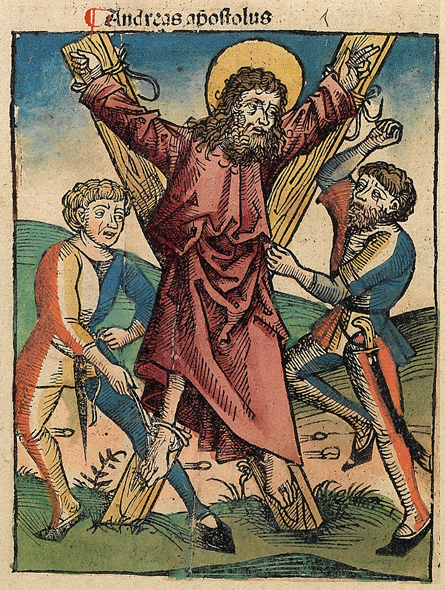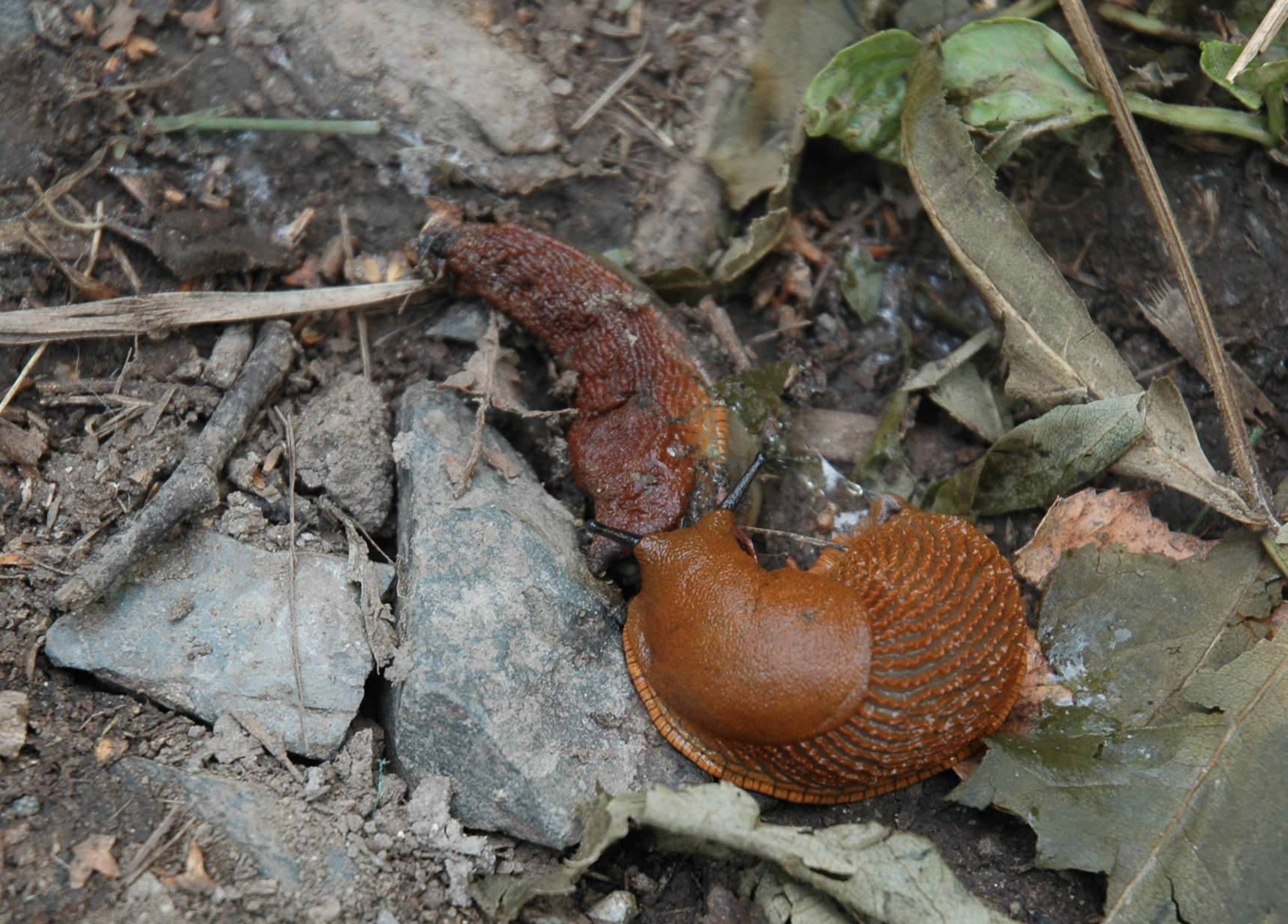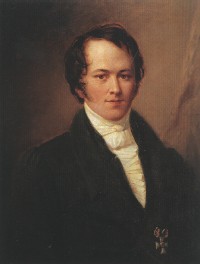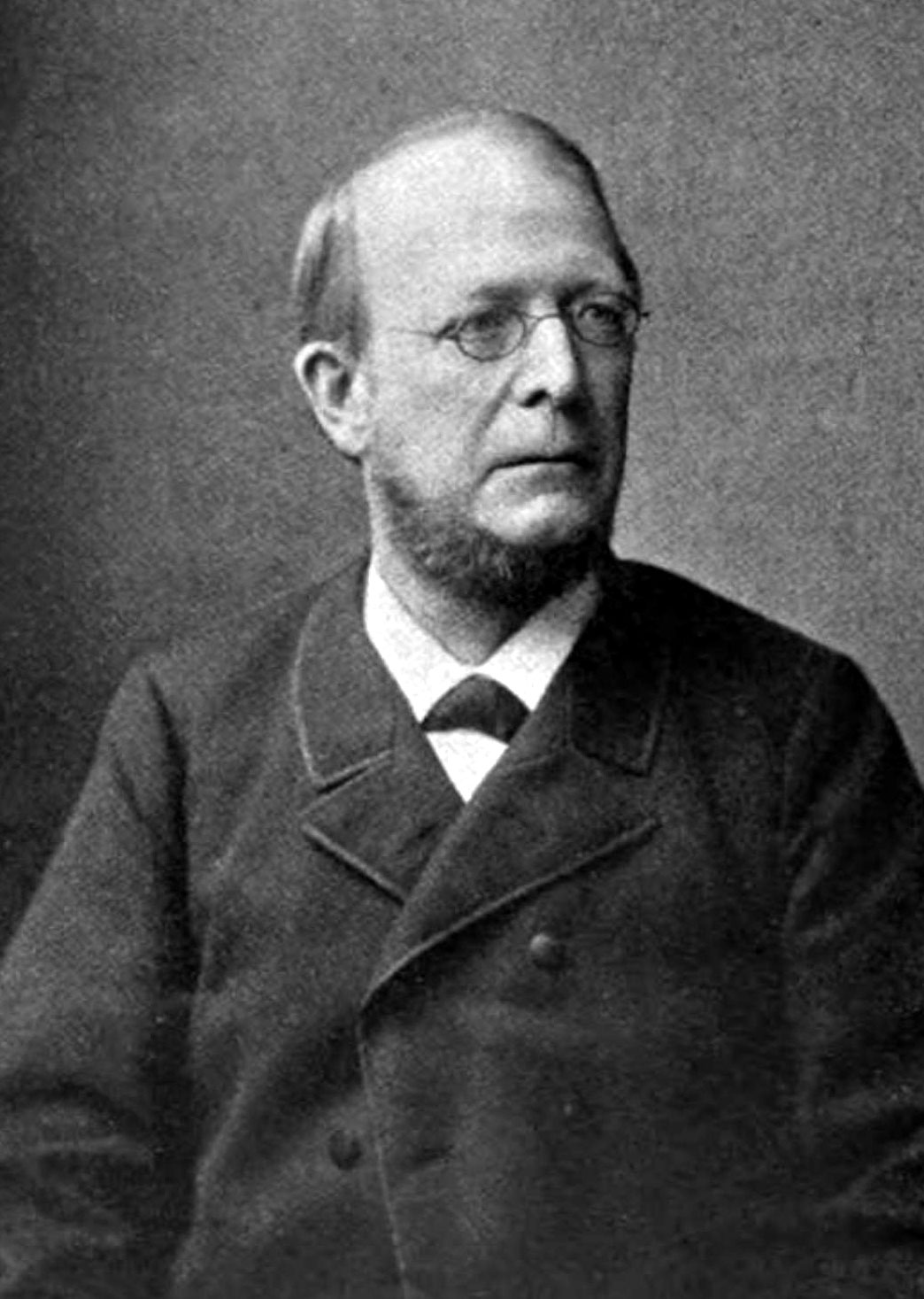|
Acta Andreae Et Matthiae Apud Anthropophagos
''Acta Andreae et Matthiae apud Anthropophagos'' ("The Acts of Andrew and Matthias among the Anthropophagi") which exists in several Latin manuscript traditions, is the dramatic romance featuring the Apostles Andrew and Matthias among the cannibals, a thriller featuring gory details that was written for a Christian audience in the 2nd century CE. Constantin von Tischendorf published an edited text following Johann Karl Thilo, 1846. ''Acta Andreae et Matthiae in urbe anthropophagarum'', according to Richard Adelbert Lipsius, belonged to the middle of the 2nd century. This apocryphal text relates that Matthias went among the cannibals and, being cast into prison, was delivered by Andrew. The narrative is considered to be a Romance and is understood to have no historical value. Heinz Hofmann classes it "secondary apocrypha", that is, one derived from apocryphal sources; the ghoulish man-eaters remind Hofmann of the killing of Socrates by the witch Meroë in Apuleius Apuleius (; ... [...More Info...] [...Related Items...] OR: [Wikipedia] [Google] [Baidu] |
Anthropophagi
An anthropophage or ''anthropophagus'' (from el, ανθρωποφάγος , translit=anthrōpophagos, "human-eater", plural el, ανθρωποφάγοι , translit=anthropophagi) was a member of a mythical race of cannibals described first by Herodotus in his '' Histories'' as ''androphagi'' ("man-eaters"), and later by other authors, including the playwright William Shakespeare. The word first appears in English around 1552. In popular culture, the ''anthropophagus'' is sometimes depicted as a being without a head, but instead have their faces on the torso. This may be a misinterpretation based on Shakespeare's writings in '' Othello'', where the ''anthropophagi'' are mistaken to be described by the immediate following line, "''and men whose heads do grow beneath their shoulders''". In reality, the line actually refers to a separate, different race of mythical beings known as the Blemmyes, who are indeed said to have no head, and have their facial features on the chest. Ac ... [...More Info...] [...Related Items...] OR: [Wikipedia] [Google] [Baidu] |
Latin
Latin (, or , ) is a classical language belonging to the Italic branch of the Indo-European languages. Latin was originally a dialect spoken in the lower Tiber area (then known as Latium) around present-day Rome, but through the power of the Roman Republic it became the dominant language in the Italian region and subsequently throughout the Roman Empire. Even after the fall of Western Rome, Latin remained the common language of international communication, science, scholarship and academia in Europe until well into the 18th century, when other regional vernaculars (including its own descendants, the Romance languages) supplanted it in common academic and political usage, and it eventually became a dead language in the modern linguistic definition. Latin is a highly inflected language, with three distinct genders (masculine, feminine, and neuter), six or seven noun cases (nominative, accusative, genitive, dative, ablative, and vocative), five declensions, four verb conjuga ... [...More Info...] [...Related Items...] OR: [Wikipedia] [Google] [Baidu] |
Romance (heroic Literature)
As a literary genre, the chivalric romance is a type of prose and verse narrative that was popular in the noble courts of High Medieval and Early Modern Europe. They were fantastic stories about marvel-filled adventures, often of a chivalric knight-errant portrayed as having heroic qualities, who goes on a quest. It developed further from the epics as time went on; in particular, "the emphasis on love and courtly manners distinguishes it from the ''chanson de geste'' and other kinds of epic, in which masculine military heroism predominates." Popular literature also drew on themes of romance, but with ironic, satiric, or burlesque intent. Romances reworked legends, fairy tales, and history to suit the readers' and hearers' tastes, but by c. 1600 they were out of fashion, and Miguel de Cervantes famously burlesqued them in his novel ''Don Quixote''. Still, the modern image of "medieval" is more influenced by the romance than by any other medieval genre, and the word ''medieva ... [...More Info...] [...Related Items...] OR: [Wikipedia] [Google] [Baidu] |
Saint Andrew
Andrew the Apostle ( grc-koi, Ἀνδρέᾱς, Andréās ; la, Andrēās ; , syc, ܐܰܢܕ݁ܪܶܐܘܳܣ, ʾAnd’reʾwās), also called Saint Andrew, was an apostle of Jesus according to the New Testament. He is the brother of Simon Peter and is a son of Jonah. He is referred to in the Orthodox tradition as the First-Called ( grc-koi, Πρωτόκλητος, Prōtoklētos, label=none). According to Orthodox tradition, the apostolic successor to Andrew is the Patriarch of Constantinople. Life The name "Andrew" (meaning ''manly, brave'', from grc-gre, ἀνδρεία, andreía, manhood, valour), like other Greek names, appears to have been common among the Jews and other Hellenized people since the second or third century B.C. MacRory, Joseph. "St. Andrew." The Catholic Encyclopedia Vol. 1. New ... [...More Info...] [...Related Items...] OR: [Wikipedia] [Google] [Baidu] |
Saint Matthias
Matthias (Koine Greek: Μαθθίας, ''Maththías'' , from Hebrew מַתִּתְיָהוּ ''Mattiṯyāhū''; cop, ⲙⲁⲑⲓⲁⲥ; died c. AD 80) was, according to the Acts of the Apostles (written c. AD 63), chosen by the apostles to replace Judas Iscariot following the latter's betrayal of Jesus and his subsequent death. His calling as an apostle is unique, in that his appointment was not made personally by Jesus, who had already ascended into heaven, and it was also made before the descent of the Holy Spirit upon the early Church. Biography There is no mention of a Matthias among the lists of disciples or followers of Jesus in the three synoptic gospels, but according to Acts, he had been with Jesus from his baptism by John until his Ascension. In the days following, Peter proposed that the assembled disciples, who numbered about 120, nominate two men to replace Judas. They chose Joseph called Barsabas (whose surname was Justus) and Matthias. Then they prayed, "Tho ... [...More Info...] [...Related Items...] OR: [Wikipedia] [Google] [Baidu] |
Pseudepigraphy
Pseudepigrapha (also anglicized as "pseudepigraph" or "pseudepigraphs") are falsely attributed works, texts whose claimed author is not the true author, or a work whose real author attributed it to a figure of the past.Bauckham, Richard; "Pseudo-Apostolic Letters", ''Journal of Biblical Literature'', Vo. 107, No. 3, September 1988, pp. 469–94. In biblical studies, the term ''pseudepigrapha'' can refer to an assorted collection of Jewish religious works thought to be written 300 BCE to 300 CE. They are distinguished by Protestants from the deuterocanonical books (Catholic and Orthodox) or Apocrypha (Protestant), the books that appear in extant copies of the Septuagint in the fourth century or later and the Vulgate, but not in the Hebrew Bible or in Protestant Bibles. The Catholic Church distinguishes only between the deuterocanonical and all other books; the latter are called biblical apocrypha, which in Catholic usage includes the pseudepigrapha. In addition, two books consi ... [...More Info...] [...Related Items...] OR: [Wikipedia] [Google] [Baidu] |
Gospel Of Matthias
The Gospel of Matthias is a lost text from the New Testament apocrypha, ascribed to Matthias, the apostle chosen by lots to replace Judas Iscariot (Acts 1:15–26). The content has been surmised from various descriptions of it in ancient works by church fathers. There is too little evidence to decide whether a Traditions of Matthias is the same work, according to J.B. Matthews, ''The Anchor Bible Dictionary'' (IV:644). Historical references This Gospel is lost, but Clement of Alexandria while describing the Nicolaitanes, quotes a sentence ascribed to Matthias urging asceticism: "we must combat our flesh, set no value upon it, and concede to it nothing that can flatter it, but rather increase the growth of our soul by faith and knowledge". The ''Gospel of Matthias'' was mentioned by Origen of Alexandria; by Eusebius, who attributes it to heretics; by Jerome, and in the Decretum Gelasianum which declares it apocryphal. It comes at the end of the list of the Biblical Canon in the ... [...More Info...] [...Related Items...] OR: [Wikipedia] [Google] [Baidu] |
Clement Of Alexandria
Titus Flavius Clemens, also known as Clement of Alexandria ( grc , Κλήμης ὁ Ἀλεξανδρεύς; – ), was a Christian theologian and philosopher who taught at the Catechetical School of Alexandria. Among his pupils were Origen and Alexander of Jerusalem. A convert to Christianity, he was an educated man who was familiar with classical Greek philosophy and literature. As his three major works demonstrate, Clement was influenced by Hellenistic philosophy to a greater extent than any other Christian thinker of his time, and in particular, by Plato and the Stoics. His secret works, which exist only in fragments, suggest that he was familiar with pre-Christian Jewish esotericism and Gnosticism as well. In one of his works he argued that Greek philosophy had its origin among non-Greeks, claiming that both Plato and Pythagoras were taught by Egyptian scholars. Clement is usually regarded as a Church Father. He is venerated as a saint in Coptic Christianity, Eastern Ca ... [...More Info...] [...Related Items...] OR: [Wikipedia] [Google] [Baidu] |
Cannibal
Cannibalism is the act of consuming another individual of the same species as food. Cannibalism is a common ecological interaction in the animal kingdom and has been recorded in more than 1,500 species. Human cannibalism is well documented, both in ancient and in recent times. The rate of cannibalism increases in nutritionally poor environments as individuals turn to members of their own species as an additional food source.Elgar, M.A. & Crespi, B.J. (1992) ''Cannibalism: ecology and evolution among diverse taxa'', Oxford University Press, Oxford ngland New York. Cannibalism regulates population numbers, whereby resources such as food, shelter and territory become more readily available with the decrease of potential competition. Although it may benefit the individual, it has been shown that the presence of cannibalism decreases the expected survival rate of the whole population and increases the risk of consuming a relative. Other negative effects may include the increased ri ... [...More Info...] [...Related Items...] OR: [Wikipedia] [Google] [Baidu] |
Constantin Von Tischendorf
Lobegott Friedrich Constantin (von) Tischendorf (18 January 18157 December 1874) was a German biblical scholar. In 1844, he discovered the world's oldest and most complete Bible dated to around the mid-4th century and called Codex Sinaiticus after Saint Catherine's Monastery at Mount Sinai, where Tischendorf discovered it. Tischendorf was made an honorary doctor by the University of Oxford on 16 March 1865, and by the University of Cambridge on 9 March 1865 following this find of the century. While a student gaining his academic degree in the 1840s, he earned international recognition when he deciphered the ''Codex Ephraemi Rescriptus'', a 5th-century Greek language, Greek Biblical manuscript, manuscript of the New Testament. Early life and education Tischendorf was born in Lengenfeld, Kingdom of Saxony, Saxony, near Plauen, the son of a physician. Beginning in 1834, he spent his scholarly career at the University of Leipzig where he was mainly influenced by Georg Benedikt ... [...More Info...] [...Related Items...] OR: [Wikipedia] [Google] [Baidu] |
Johann Karl Thilo
Johann Karl Thilo (Langensalza, near Erfurt, 28 November 1794 — Halle 17 May 1853) was a German theologian and biblical scholar. He studied theology at the University of Leipzig and a final semester at the University of Halle, where he was appointed to teach at the preparatory ''Paedagogium'' of the Francke institutions, and assisted his father-in-law, Georg Christian Knapp, director of the theological seminary. In 1820 he travelled to Paris, London and Oxford with his colleague Heinrich Friedrich Wilhelm Gesenius for the examination of rare Eastern manuscripts. At Halle he was ''privat-docent'' from 1819, appointed professor of theology (1822, full professor, 1825) and in 1853 a consistorial councillor of the Evangelical State Church in Prussia. He lectured on the history of dogma, church history, patristics, and after Knapp's death, on the New Testament. He is remembered for his planned series of editions of apocrypha, ''Codex Apocryphus Novi Testamenti'' of which the first ... [...More Info...] [...Related Items...] OR: [Wikipedia] [Google] [Baidu] |
Richard Adelbert Lipsius
Richard Adelbert Lipsius (14 February 1830 in Gera, Thuringia – 19 August 1892 in Jena, Thuringia) was a German Protestant theologian. Biography Richard Adelbert Lipsius was the son of K. H. A. Lipsius (d. 1861), who was rector of the school of St. Thomas at Leipzig, was born at Gera on 14 February 1830. He studied at Leipzig, and eventually (1871) settled at Jena as professor ordinaries. He helped to found the "Evangelical Protestant Missionary Union" and the "Evangelical Alliance", and from 1874 took an active part in their management. He died at Jena on 19 August 1892. Works Lipsius wrote principally on dogmatics and the history of early Christianity from a liberal and critical standpoint. A Neo-Kantian, he was to some extent an opponent of Albrecht Ritschl, demanding This, in part, is Lipsius's attitude in ''Philosophie und Religion'' (1885). In his ''Lehrbuch der evangelisch-protestantischen Dogmatik'' (1876; 3rd ed., 1893) he deals in detail with the doctrines of "God" ... [...More Info...] [...Related Items...] OR: [Wikipedia] [Google] [Baidu] |



_-_Foto_G._Dall'Orto.jpg)


